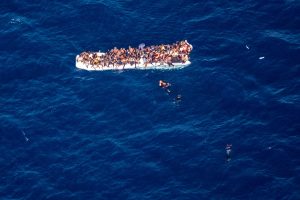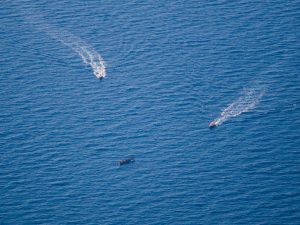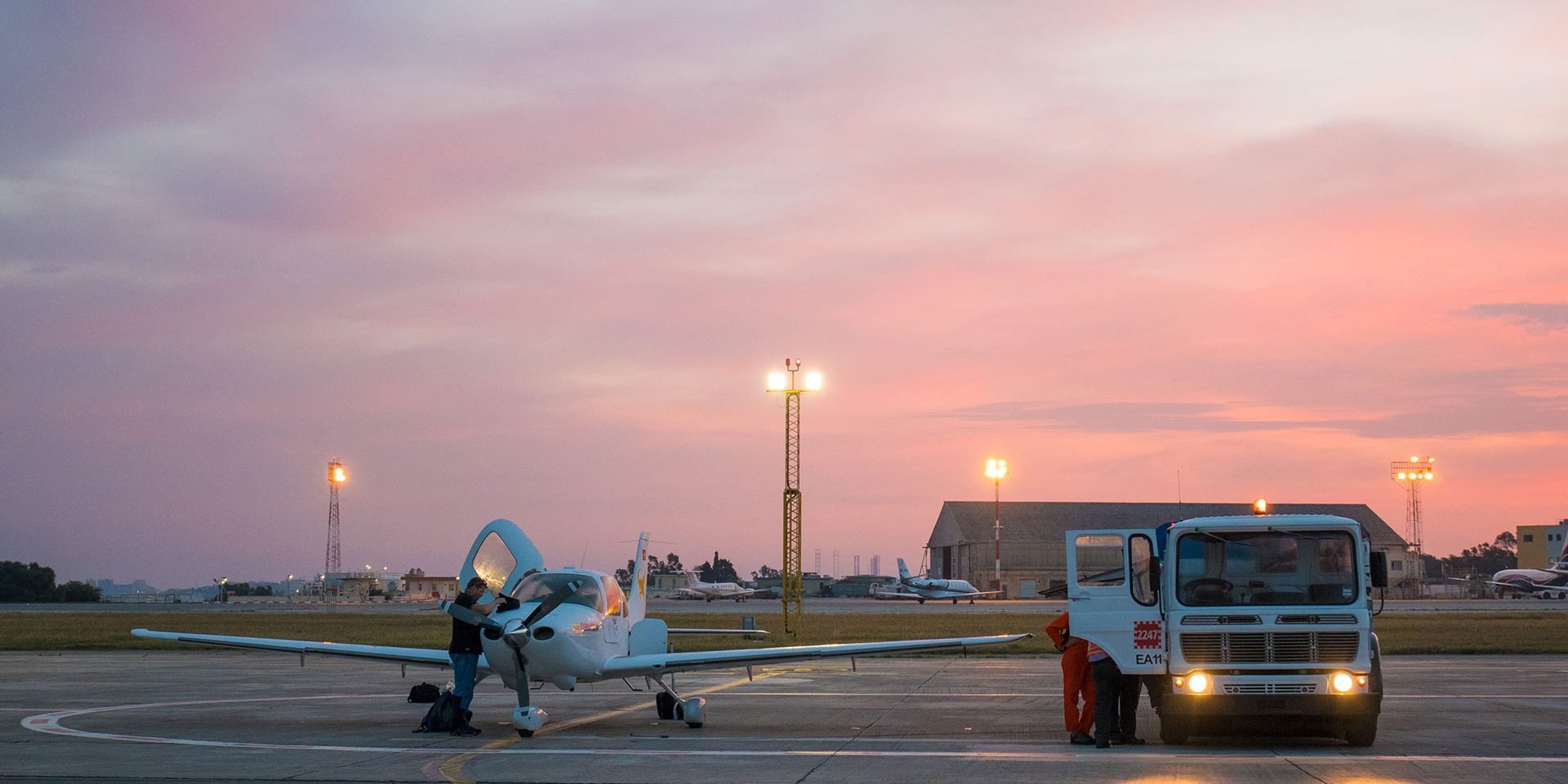On easter sunday, more than 100 Refugees were saved at the last minute from a sinking rubber boat off the coast of Libya, after being spotted by a reconnaissance aircraft far from any rescue ship. At least seven of the occupants had already drowned at this point in time. This describes the current record of the new common reconnaissance mission of Sea-Watch and the Humanitarian Pilots Initiative (HPI) that started on the easter weekend. Thanks to the generous support of the Evangelical Church in Germany (EKD), our light aircraft with the call-sign “Moonbird” will be operating for the entire summer with three objectives: to coordinate search-and-rescue missions, to exert pressure on the European Union that lets people drown in the Mediterranean and to prevent tragic boat accidents like the one on easter sunday.
 “At first it was only a dot on the horizon, but then it became quickly apparent to us that we were witnessing a tragedy: there were no rescue ships in sight and some of the occupants had already gone overboard”, reports pilot Fabio Zgraggen. “Through performing a series of special maneuvres with the light aircraft we were able to direct a libyan fishingboat’s attention to the sinking rubber boat. They began pulling several people out of the sea and with the assistance of speedboats from Jugend Rettet and MOAS, worse consequences could be averted.” There were several dead bodies floating in the water at this point. “Without the aerial rescue operations we would potentially be counting more than 100.” A similar incident in the previous week had cost the lives of at least 97 people.
“At first it was only a dot on the horizon, but then it became quickly apparent to us that we were witnessing a tragedy: there were no rescue ships in sight and some of the occupants had already gone overboard”, reports pilot Fabio Zgraggen. “Through performing a series of special maneuvres with the light aircraft we were able to direct a libyan fishingboat’s attention to the sinking rubber boat. They began pulling several people out of the sea and with the assistance of speedboats from Jugend Rettet and MOAS, worse consequences could be averted.” There were several dead bodies floating in the water at this point. “Without the aerial rescue operations we would potentially be counting more than 100.” A similar incident in the previous week had cost the lives of at least 97 people.
“Our objective for the operation of the aircraft is to prevent boat accidents. The first operating days have already shown that we are capable of it” says Ruben Neugebauer, the project manager of the aerial reconnaisance mission. “We also want to build pressure on the European Union that knowingly lets people drown by blocking safe passages and denying sea rescue operations.”The spotting aircraft of type Cirrus SR22 has the capability to overfly the mediterranean north of the libyan coast and to detect boats in distress whenever necessary, even when there are no ships in close proximity. “We are well-prepared for these missions thanks to additional security features such as the emergency parachute system and specialized communication technology and thanks to several experienced pilots who have already gotten in touch with us because they want to support our mission. After a few tests last year we have come up with a good solution,” says the swiss pilot Zgraggen.
The aircraft closes a gap in civilian sea rescue
 “This aircraft closes a gap in civilian sea rescue. Over the last year, the civilian search-and-rescue fleet has already excelled at providing safety where the European Union failed to provide sufficient rescue services. From now on the aircraft enables us to use current resources more efficiently: not only are we able to spot boats in distress, but we are also able to support the coordination of rescue vessels because our aircraft provides a very good overview”, explains Zgraggen. “Thanks to generous support from the Evangelical Church and numerous donations we will be in a position to save many more lives over the summer with our light aircraft. We will also be documenting the European Union’s recurrent non-assistance” adds head-of-operations Neugebauer.
“This aircraft closes a gap in civilian sea rescue. Over the last year, the civilian search-and-rescue fleet has already excelled at providing safety where the European Union failed to provide sufficient rescue services. From now on the aircraft enables us to use current resources more efficiently: not only are we able to spot boats in distress, but we are also able to support the coordination of rescue vessels because our aircraft provides a very good overview”, explains Zgraggen. “Thanks to generous support from the Evangelical Church and numerous donations we will be in a position to save many more lives over the summer with our light aircraft. We will also be documenting the European Union’s recurrent non-assistance” adds head-of-operations Neugebauer.
The Moonbird, after which the aircraft is named, is a migratory bird species that yearly travels a route equivalent to the distance between the earth and the moon over the sea and overcomes many borders along the way. “Migration has always existed and there have been different handlings of this phenomenon over the course of history. Sealing-off has never really worked out, but the EU has chosen this path and is apparently prepared to ignore fundamental human rights for it,” says Ruben Neugebauer. “It is completely unacceptable that thousands of people drown every year at the border of prosperity between Europe and Africa. We will do everything in our power to put an end to this state of affairs with our reconnaissance aircraft.”











